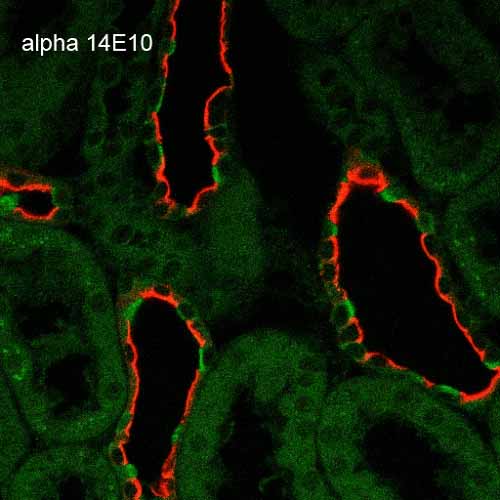ENaC alpha Antibody
ENaC alpha Antibody, Clone 14E10
- SPECIFICATION
- CITATIONS
- PROTOCOLS
- BACKGROUND

Application
| WB, IHC |
|---|---|
| Primary Accession | Q6IRJ1 |
| Other Accession | NP_113736 |
| Host | Mouse |
| Isotype | IgG1 |
| Reactivity | Mouse, Rat |
| Clonality | Monoclonal |
| Description | Mouse Anti-Rat ENaC alpha Monoclonal IgG1 |
| Target/Specificity | Detects ~85kDa. |
| Other Names | SCNN1A Antibody, Epithelial Sodium Channel-α Antibody, Epithelial Sodium Channel alpha Antibody, Alpha ENaC 2 Antibody, Alpha ENaC Antibody, Alpha NaCH Antibody, Alpha-ENaC Antibody, Amiloride sensitive epithelial sodium channel alpha subunit Antibody, Amiloride sensitive sodium channel subunit alpha Antibody, Amiloride-sensitive sodium channel subunit alpha Antibody, ENaCa Antibody, ENaCalpha Antibody, Epithelial Na(+) channel subunit alpha Antibody, Epithelial Na+ channel subunit alpha Antibody, FLJ21883 Antibody, Nonvoltage gated sodium channel 1 subunit alpha Antibody, Nonvoltage-gated sodium channel 1 subunit alpha Antibody, SCNEA Antibody, SCNN 1 Antibody, SCNN1 Antibody, SCNN1A Antibody, SCNNA_HUMAN Antibody, Sodium channel nonvoltage gated 1 alpha Antibody |
| Clone Names | 14E10 |
| Immunogen | Synthetic peptide from the N-terminal of Rat ENaC alpha (aa. 46-68) |
| Purification | Protein G Purified |
| Storage | -20ºC |
| Storage Buffer | PBS pH7.4, 50% glycerol, 0.09% sodium azide |
| Shipping Temperature | Blue Ice or 4ºC |
| Certificate of Analysis | A 1:1000 dilution of SMC-242 was sufficient for detection of ENaC alpha in 15 µg of Mouse whole kidney lysate by ECL immunoblot analysis using goat anti-mouse IgG:HRP as the secondary antibody. |
| Cellular Localization | Apical Cell Membrane |

Thousands of laboratories across the world have published research that depended on the performance of antibodies from Abcepta to advance their research. Check out links to articles that cite our products in major peer-reviewed journals, organized by research category.
info@abcepta.com, and receive a free "I Love Antibodies" mug.
Provided below are standard protocols that you may find useful for product applications.
Background
The Epithelial Sodium Channel (ENaC) is a membrane ion channel permeable to Na+ ions. It is located in the apical plasma membrane of epithelia in the kidneys, lung, colon, and other tissues where it plays a role in trans epithelial Na+-ion transport (1). Specifically Na+ transport via ENaC occurs across many epithelial surfaces, and plays a key role in regulating salt and water absorption (2). ENaCs are composed of three structurally related subunits that form a tetrameric channel, alpha, beta, and gamma. The expression of its alpha and beta subunits is enhanced as keratinocytes differentiate (3, 4). The beta and gamma-ENaC subunits are essential for edema fluid to exert its maximal effect on net fluid absorption by distal lung epithelia(5). And it has been concluded that the subunits are differentially expressed in the retina of mice with ocular hypertension, therefore the up-regulation of alpha-ENaC proteins could serve as a protection mechanism against elevated intraocular pressure (6).
References
1. Kakizoe Y., et al. (2009) J Hpyertens. 27(8): 1679-1689.
2. Gu Y. (2008) J Cell Physiol. 216(2):453-457.
3. Bruns J.B. (2003) Am J Physiol Renal Physiol. 285(4): F600-F609.
4. Mauro T., et al. (2002) J Invest Dermatol. 118(4): 589-594.
5. Elias N., et al. (2007) Am J Physiol Lung Cell Mol Physiol. 293(3): L537-45.
6. Dyka F.M., May C.A. and Enz R. (2005) J Neurochem. 94(1): 120-128.
If you have used an Abcepta product and would like to share how it has performed, please click on the "Submit Review" button and provide the requested information. Our staff will examine and post your review and contact you if needed.
If you have any additional inquiries please email technical services at tech@abcepta.com.













 Foundational characteristics of cancer include proliferation, angiogenesis, migration, evasion of apoptosis, and cellular immortality. Find key markers for these cellular processes and antibodies to detect them.
Foundational characteristics of cancer include proliferation, angiogenesis, migration, evasion of apoptosis, and cellular immortality. Find key markers for these cellular processes and antibodies to detect them. The SUMOplot™ Analysis Program predicts and scores sumoylation sites in your protein. SUMOylation is a post-translational modification involved in various cellular processes, such as nuclear-cytosolic transport, transcriptional regulation, apoptosis, protein stability, response to stress, and progression through the cell cycle.
The SUMOplot™ Analysis Program predicts and scores sumoylation sites in your protein. SUMOylation is a post-translational modification involved in various cellular processes, such as nuclear-cytosolic transport, transcriptional regulation, apoptosis, protein stability, response to stress, and progression through the cell cycle. The Autophagy Receptor Motif Plotter predicts and scores autophagy receptor binding sites in your protein. Identifying proteins connected to this pathway is critical to understanding the role of autophagy in physiological as well as pathological processes such as development, differentiation, neurodegenerative diseases, stress, infection, and cancer.
The Autophagy Receptor Motif Plotter predicts and scores autophagy receptor binding sites in your protein. Identifying proteins connected to this pathway is critical to understanding the role of autophagy in physiological as well as pathological processes such as development, differentiation, neurodegenerative diseases, stress, infection, and cancer.


